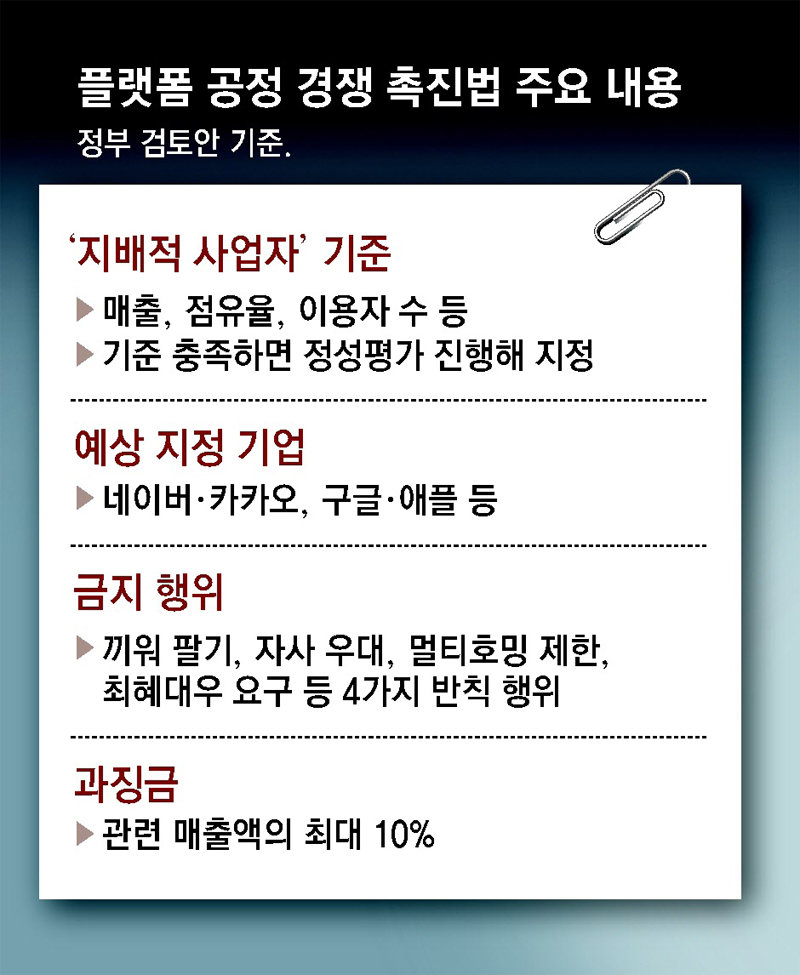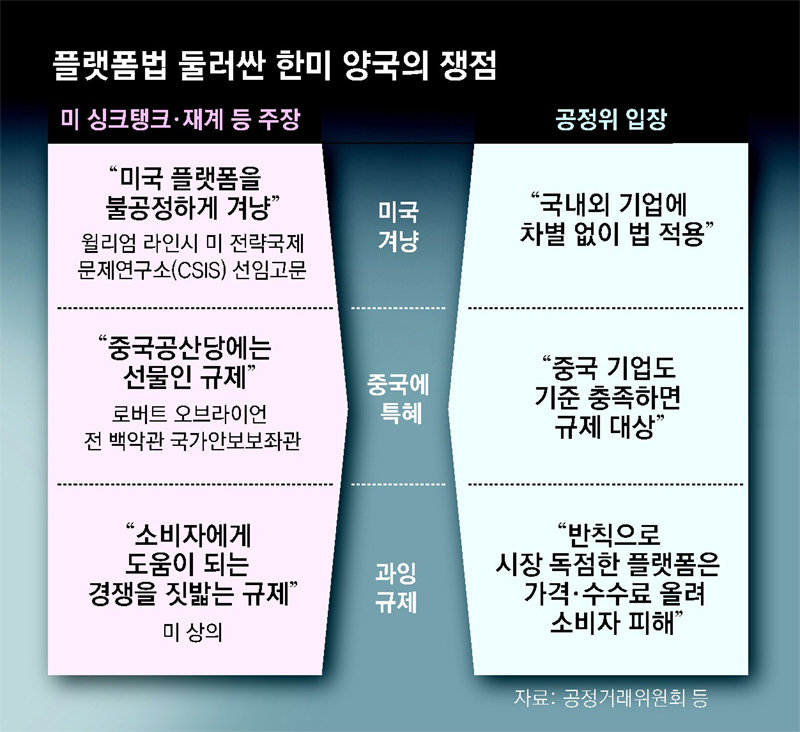[플랫폼법 논란]
The U.S. Chamber of Commerce, which represents the U.S. business community, has publicly opposed the ‘Platform Fair Competition Promotion Act’ legislation being promoted by the Fair Trade Commission, saying it could violate trade agreements.
On this day, the U.S. Chamber of Commerce issued a statement under the name of Charles Freeman, Senior Vice Chairman of Asia, asserting, “The platform violation law tramples competition that benefits consumers, ignores good regulatory practices, and arbitrarily targets foreign companies.” He then urged the Fair Trade Commission to provide sufficient opportunities to collect opinions from stakeholders, including the U.S. business community, before enacting legislation.

This bill designates a small number of large platform companies as ‘dominant operators’ in advance and regulates them from engaging in foul play, such as pushing out competitors. There is a growing backlash against the prospect that big American tech companies such as Google and Apple will be subject to regulation, with the U.S. business community hinting at a response by mentioning the possibility of violating the Korea-U.S. Free Trade Agreement (FTA).
The United States is particularly concerned that Chinese big tech companies, which still have a low market share in Korea, will seek to benefit from this regulation. Former White House National Security Advisor Robert O’Brien, who is likely to be appointed Secretary of State if former President Donald Trump returns to power in the November U.S. presidential election, also recently strongly criticized this law, saying, “It is a loss to the United States and a gift to the Chinese Communist Party.”
Possibility of regulation of U.S. big tech, including Google
“Violation of prohibition of discrimination against foreign companies” by the U.S. Department of Commerce… Trump’s closest aide: “Loss to the US Yen, gift to the Chinese Yen”
Ministry of Trade, Industry and Energy “Review whether there is a possibility of violating FTA”
Opposition in the United States to the Fair Trade Commission’s designation of dinosaur platform companies such as Naver and Google as targets of regulation is spreading across all fronts. As most of the global platforms are of American nationality, it is said that this law actually discriminates against American companies. As global competition over digital economic hegemony intensifies, there is an interpretation that voices within the United States calling for the protection of domestic platforms are becoming stronger.
The Fair Trade Commission has begun to evolve, saying that companies that meet certain standards are subject to regulation regardless of nationality, but the controversy does not seem to be going away easily. In response to criticism that the ‘Platform Fair Competition Promotion Act’ (Platform Competition Act) violates the Korea-US Free Trade Agreement (FTA), the government is looking into the possibility of trade friction.

On the 29th (local time), the U.S. Chamber of Commerce actually opposed the platform violation law, saying, “It has the potential to violate the Korea-U.S. FTA, which prohibits discriminatory regulations against foreign companies.” In December of last year, the American Chamber of Commerce in Korea (AMCHAM) delivered a written opinion to the Fair Trade Commission stating that the platform violation law could weaken the competitiveness of U.S. platform companies, and a similar point was made again.
The Platform Competition Act is a law that pre-designates a small number of large platform companies as ‘dominant operators’ and prohibits actions aimed at driving out competitors, such as preferential treatment of their own products. The purpose is to prevent consumers from being harmed by the abuse of market power by large platform companies that unfairly monopolize the market.
The American business community is taking issue with the fact that most of the dinosaur platforms with high influence in the Korean market are of American nationality. This law ultimately violates the Korea-U.S. FTA, which prohibits discrimination against American companies. Inside and outside the government, it is expected that domestic platforms such as Naver and Kakao, as well as American companies such as Google and Apple, will be subject to prior regulation under the Platform Violation Act.
It is pointed out that the vagueness of the ‘consumer welfare’ that the Fair Trade Commission cited as the basis for its promotion is also increasing concerns in the U.S. business community. As more users gather in the platform market, consumer convenience can also increase. This means that monopoly may not necessarily lead to consumer harm such as price increases.
Lee Hwang, a professor at Korea University Law School, pointed out, “Among the four major illegal acts prohibited by the platform violation law, there are acts that are ultimately helpful to consumers, such as ‘tie-in sales.’” Song Young-gwan, a senior researcher at the Korea Development Institute (KDI), a trade expert, also said, “Because it has not been clearly shown that any harm was done to consumers, there is a good chance that it will lead to trade friction.” He added, “It is a new type of advance regulation internationally and the regulations “As most of the targets are domestic companies, the United States has no choice but to react sensitively,” he said.
The Fair Trade Commission began to evolve, saying, “We will not discriminate against domestic and foreign companies.” Once the designation standards are finalized through consultation with relevant ministries and the National Assembly, platform companies that meet them will be regulated regardless of nationality.
He also drew a line against claims that the platform violation law only benefits Chinese companies. As ‘dominant business’ designation is made periodically, Chinese big tech companies such as Alibaba may also be subject to regulation if their sales or market share increase in Korea. Previously, former White House National Security Advisor Robert O’Brien, a close associate of former U.S. President Donald Trump, criticized the platform violation law on December 28 last year, calling it “a regulation that is detrimental to the United States but a gift to the Chinese Communist Party.”
However, the government is closely examining the claims of the U.S. business community to prepare for the possibility that the platform violation law may lead to trade friction. An official from the Ministry of Trade, Industry and Energy said, “As there are many voices of concern in the United States, we are looking into possible violations of the FTA.” The Fair Trade Commission also plans to listen to the opinions of stakeholders, including U.S. platform companies, during the subsequent legislative process once the government plan is finalized through consultation with related ministries.
Washington =
Sejong =
Source: Donga
Mark Jones is a world traveler and journalist for News Rebeat. With a curious mind and a love of adventure, Mark brings a unique perspective to the latest global events and provides in-depth and thought-provoking coverage of the world at large.